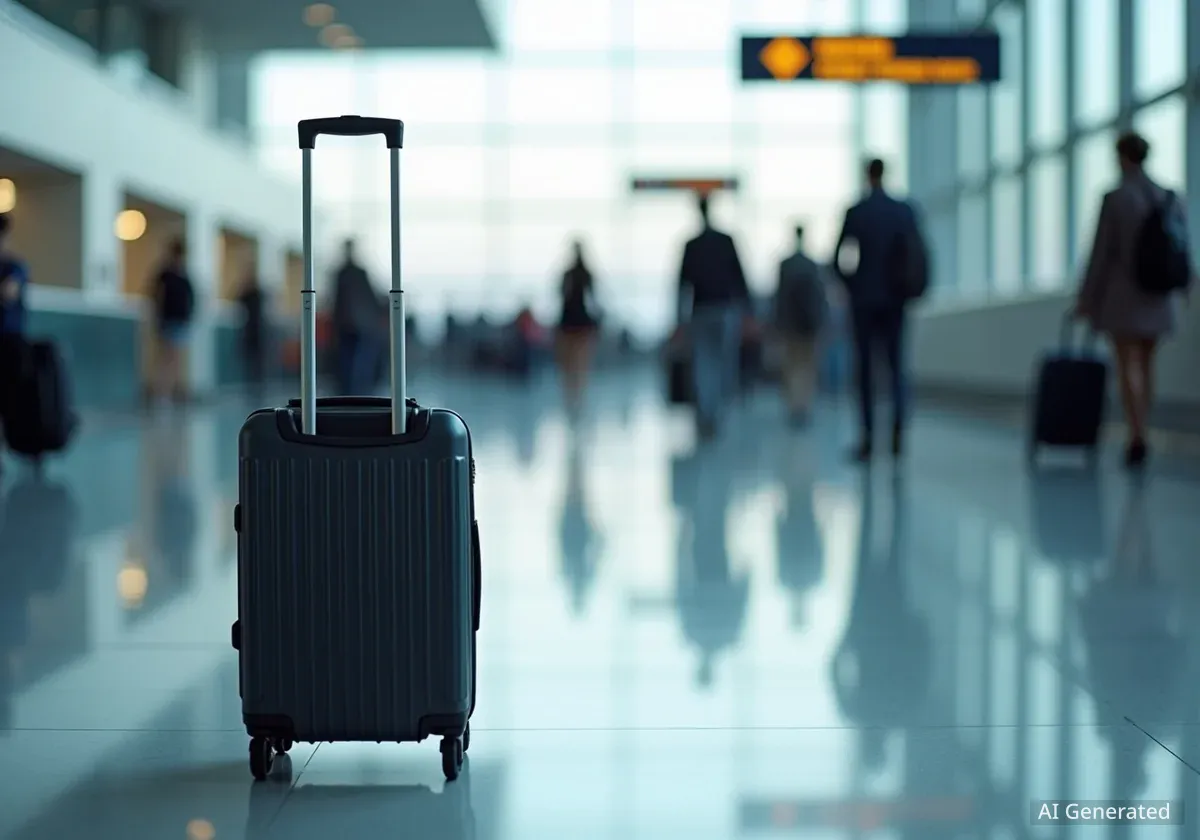Airline passenger rights are facing significant challenges, with ongoing efforts to reduce existing protections. Travelers are increasingly finding themselves in situations where their basic entitlements, such as cash refunds for canceled flights or clear fee disclosures, are at risk. Understanding current rights and adopting proactive strategies has become essential for air travelers.
Key Takeaways
- Airline passenger rights are decreasing due to industry lobbying.
- Key protections like automatic refunds and fee transparency are targeted.
- Travelers need to be proactive to protect themselves.
- Strategies include knowing your rights, using credit cards, and keeping detailed records.
- Third-party travel insurance and official complaints are important last resorts.
The Shrinking Landscape of Passenger Protections
Many air travelers report feeling like second-class citizens, a sentiment that aligns with recent trends. Janice Lintz, a disability advocate from Washington, DC, experienced this firsthand. Her flight from Philadelphia to New York was canceled. She waited at the airport, only to receive a $10 meal voucher and 7,500 miles. "It was insulting," Lintz stated. "I think without consumer protections, travelers are going to be treated miserably."
Her experience highlights a broader issue: airline passenger rights are diminishing. A recent decision by the U.S. government to abandon proposed compensation rules for delays marks a significant shift. This decision, detailed in previous reports, is not an isolated incident. Airlines are actively lobbying to dismantle consumer protections established over decades.
Background on Deregulation Efforts
The Department of Transportation (DOT) has publicly committed to enforcing existing laws. However, this commitment faces challenges from airline industry lobbying. A 93-page document from the industry outlines a plan to reduce passenger protections. This effort aims to decrease regulations that currently safeguard travelers.
Key Protections Under Threat
The airline industry seeks to eliminate several fundamental consumer protections. These changes would impact millions of travelers annually.
- Automatic Refund Requirements: Airlines want to remove the obligation to provide automatic cash refunds for flight changes or cancellations.
- Fee Transparency Rules: The industry aims to end regulations that require upfront disclosure of baggage and seat selection fees.
- Accessibility Protections: Protections for passengers with disabilities are also being targeted.
- Family Seating Rules: Enforcement of rules designed to help families sit together is on the chopping block.
These proposed changes conflict with what most airline passengers want. A survey by AirHelp found that 52 percent of U.S. travelers believe air passenger regulations should be stronger. "Airlines will have less accountability," said Susan Sherren, founder of Couture Trips. "This means that travelers will need to take steps to protect themselves."
Current Passenger Rights: What Remains?
Before discussing defense strategies, it is important to understand the rights passengers currently retain. These protections offer some level of security, but their future remains uncertain.
Current Core Rights
- Automatic Refunds: If a flight is canceled or significantly changed, and the passenger chooses not to travel, a full cash refund is required within 7 business days for credit card payments or 20 days for other methods.
- Full-Fare Advertising: Advertised prices must include all mandatory taxes and fees, preventing surprise charges at checkout.
- Basic Accessibility: Airlines are prohibited from discriminating against passengers with disabilities, although enforcement can vary.
- Tarmac Delay Rules: During long ground delays after boarding, airlines must provide food, water, and working restrooms. Passengers must also be allowed to deplane after 3 hours for domestic flights or 4 hours for international flights.
- Overbooking Compensation: If a passenger is involuntarily denied boarding due to overbooking, compensation is owed based on the ticket price and delay length.
This list represents the core of federal passenger protection in the United States. Compared to regions like Europe, where passengers can claim hundreds of dollars for delays over three hours, U.S. protections appear limited. This disparity explains why a majority of American air travelers desire stronger rights.
Airlines are not attempting to dismantle these regulations all at once. Instead, they are employing a strategy of "drip erosion." This involves a gradual wearing away of rights, making changes slowly enough that passengers may not immediately notice the full impact. However, travelers do not have to wait until they face a situation like Janice Lintz's to act.
Strategies for Protecting Your Rights
Despite the challenges, travelers are not without options. "In the absence of formal airline compensation policies, there are still some steps that travelers can take to better protect themselves," explained Ivalyo Danailov, CEO of SkyRefund, a company specializing in airline compensation.
1. Understand Your Existing Rights
Knowledge is a powerful tool. When issues arise, use precise language that reflects legal obligations. The DOT website outlines current passenger rights, though this information may change. Key phrases to remember include: "I’m requesting a full cash refund under DOT regulations for this canceled flight," or "This is a significant schedule change that entitles me to a refund."
"When airlines know you’re documenting like you’re building a legal case, their customer service approach changes dramatically," says attorney Michael Weiss, who has handled numerous airline disputes.
2. Choose the Right Payment Method
The method of payment can significantly impact your ability to recover funds. "Pay for tickets with a credit card, not a debit card," advises Daria Volochniuk, chief operating officer at FlightRefunder. "That way, you can appeal the transaction." The Fair Credit Billing Act allows consumers to file a chargeback for services not delivered or not as described, such as a canceled airline ticket.
3. Maintain Detailed Records
Thorough documentation is crucial. "Paperwork is your best safeguard," states William Holland, a St. Louis attorney experienced in airline disputes. He advises saving fare and fee pages as screenshots and obtaining all offers in writing. Avoid accepting vouchers if you are entitled to cash.
Consider taking screenshots of booking pages showing original flight times and prices. Save all email confirmations and notifications of changes. Photograph delay announcements on airport monitors. Most importantly, keep all receipts related to your travel.
4. Invest in Comprehensive Travel Insurance
Airline-offered coverage is often limited. Instead, purchase comprehensive third-party travel insurance. This type of policy can cover trip interruptions, cancellations, medical emergencies, baggage loss, and missed connections. Emily Tarkany, Vice President of Marketing at Trawick International, has observed customers left stranded after flight cancellations.
"Insurance can step in to cover some of those gaps," Tarkany noted. "But ideally, protections like refunds and fee disclosures would already be guaranteed without travelers having to fight for them."
5. Consider "Nuclear" Options
For unresolved disputes, two final options exist. One is filing a complaint with the DOT. The DOT is obligated to investigate these complaints, at least under current rules. The other is initiating a chargeback on your credit card for services not rendered. "Doing both accelerates compliance," observes attorney John Beck.
These methods are considered last resorts due to their formal nature and potential for extended processes. However, they provide a path when other attempts fail.
The Broader Fight for Passenger Rights
While individual actions are important, collective action also plays a vital role. "Passengers are sure to suffer because of the airlines’ lack of incentive to operate efficiently," predicts Danny Karon, author of “Your Lovable Lawyer’s Guide to Legal Wellness.” He emphasizes that individual protection is essential, but collective efforts also matter.
Travelers can join consumer advocacy groups dedicated to passenger rights, such as Travelers United and Flyersrights.org. Supporting political candidates who prioritize consumer protection over industry profits is another avenue. Additionally, travelers can vote with their wallets by choosing airlines known for treating passengers fairly, even when not legally required.
For decades, nonprofit consumer organizations have worked to assist travelers, often avoiding political involvement. However, many supporters now indicate that the erosion of aviation consumer protections will influence their votes in upcoming elections.
Preparing for Your Next Flight
Even as airline rights face reduction, travelers are not powerless. Preparation before a problem occurs is key. For shorter trips, consider alternative transportation options like driving or taking a train, as Janice Lintz might do for her next Philadelphia to New York journey.
Do not rely on airlines to voluntarily do the right thing when it comes to passenger rights. It is time for travelers to proactively defend their interests. Airlines may be betting that passengers will not fight back. It is up to individual travelers to prove them wrong.
Your Airline Rights Defense Plan
Rights at risk:
- Automatic cash refunds
- Upfront fee transparency
- Family seating rules
- Accessibility protections
Your five-step defense plan:
- Know the rights you still have: Use specific language when complaining, such as "I’m requesting a full cash refund under DOT regulations." This shows awareness of the law.
- Use a credit card: Paying with a credit card allows you to file a chargeback under the Fair Credit Billing Act if services are not delivered.
- Keep detailed records: Screenshot booking pages, save emails, and keep all receipts to build a strong case.
- Buy real travel insurance: Purchase comprehensive, third-party travel insurance for coverage gaps like trip interruptions and lost luggage.
- Go "nuclear" when necessary: If the airline is unresponsive, file an official complaint with the Department of Transportation (DOT) and initiate a credit card chargeback.





